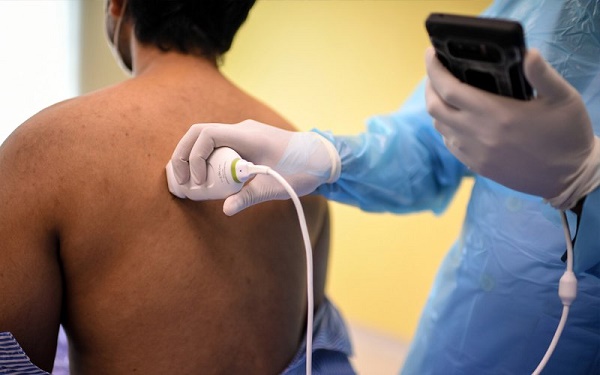
KANGAR: If there is a tool that can increase efficiency and lighten the burden of overworked frontliners battling Covid-19, shouldn’t doctors embrace it?
According to Hospital Tuanku Fauziah’s (HTF) advanced acute internal medicine consultant Dr Paras Doshi, a pocket-sized ultrasound device is already in use in Malaysian hospitals as a diagnostic tool for the early detection of Covid-19 complications.
He said it is compatible with smartphones and tablets, and gives doctors more freedom of movement.
Paras said patients will not have to go for an imaging test of their organs, like the heart, lungs and kidneys, using bulky equipment like a computerised tomography (CT) scanner because the portable device serves the purpose.
He said it reduces the risk of frontliners and patients catching the virus as the diagnosis can be done on the spot.
The Malaysian Advanced Acute Internal Medicine and Ultrasound Society (Maaimuss) president said a quicker diagnosis can reduce ward admissions.
“Hence, only patients who need treatment, like Covid-19 patients, will be admitted,” he said.
Paras said HTF in Kangar is among the pioneers of this technology and has seen ward admissions to its emergency department drop by 62% compared to the past.
“It hasn’t just reduced overcrowding in the ward, but cost and hospitalisation time too, allowing resources to be used for Covid-19 patients,” he said.
He said the Malaysian Advanced Acute Internal Medicine and Ultrasound Society, which is under the patronage of the Raja Muda of Perlis, Tuanku Syed Faizuddin Putra Jamalullail, had been entrusted with conducting training webinars to show doctors how to use the device.
The device, he said, would come in particularly handy for hospitals in the interior. “For example, if there is a Covid-19 case in a remote hospital in Lahad Datu, Sabah, the medical officer can make an early diagnosis without needing to transfer the patient to a bigger hospital.
The results of the examination can then be shared with a specialist doctor and thereby develop a treatment plan for the patient.
- Date Fri, 2 Jul 2021
- Outbreak Covid-19
- Category National
- View 1330

 English
English
 English
English